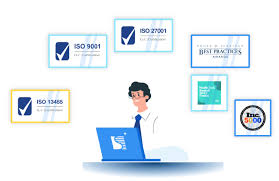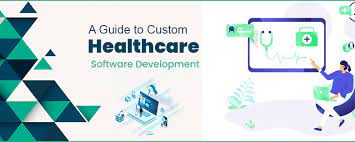Innovating Healthcare: The Impact of Software Development Companies in the Industry
The Role of Healthcare Software Development Companies in Revolutionizing the Industry
Healthcare software development companies play a crucial role in advancing the healthcare industry by creating innovative solutions that improve patient care, streamline processes, and enhance efficiency. These companies specialize in developing custom software applications tailored to the unique needs of healthcare providers, hospitals, clinics, and other medical facilities.
Key Contributions of Healthcare Software Development Companies:
- Electronic Health Records (EHR) Systems: Healthcare software developers create EHR systems that allow medical professionals to access and manage patient information securely. These systems facilitate better coordination of care and improve patient outcomes.
- Telemedicine Platforms: With the rise of telehealth services, healthcare software development companies are at the forefront of creating platforms that enable remote consultations, virtual visits, and remote monitoring of patients. These platforms enhance access to care and reduce barriers to healthcare services.
- Medical Imaging Software: Healthcare software developers design advanced imaging software for radiology departments, enabling accurate diagnostics and efficient image management. These tools help healthcare providers make informed decisions and deliver quality care to patients.
- Healthcare Analytics Solutions: Data-driven decision-making is essential in modern healthcare. Software development companies create analytics solutions that help healthcare organizations analyze clinical data, optimize operations, and improve patient outcomes through predictive modeling and insights.
The Future of Healthcare Software Development:
As technology continues to evolve, healthcare software development companies will play an increasingly critical role in shaping the future of healthcare delivery. From artificial intelligence and machine learning applications to blockchain solutions for secure data exchange, these companies are at the forefront of driving innovation in the industry.
In conclusion, healthcare software development companies are instrumental in transforming the way healthcare is delivered and managed. Their expertise in creating tailored solutions for the unique challenges faced by the industry helps improve patient care quality, increase operational efficiency, and drive overall advancements in healthcare services.
9 Essential Tips for Choosing a Healthcare Software Development Company
- Ensure compliance with healthcare regulations such as HIPAA
- Prioritize data security and encryption to protect patient information
- Implement robust access controls to safeguard sensitive data
- Focus on user-friendly interfaces for healthcare professionals and patients
- Integrate interoperability standards for seamless data exchange between systems
- Conduct thorough testing to ensure reliability and accuracy of the software
- Stay updated with industry trends and advancements in healthcare technology
- Provide comprehensive training and support for users of the software
- Establish strong partnerships with healthcare providers for feedback and collaboration
Ensure compliance with healthcare regulations such as HIPAA
Ensuring compliance with healthcare regulations such as the Health Insurance Portability and Accountability Act (HIPAA) is paramount for healthcare software development companies. By adhering to HIPAA guidelines, these companies prioritize the protection of sensitive patient information and maintain the highest standards of data security and privacy. Compliance with regulations like HIPAA not only builds trust with healthcare providers and patients but also mitigates the risk of legal repercussions. Healthcare software development companies must integrate robust security measures and data encryption protocols to safeguard patient data and uphold regulatory compliance in all their software solutions.
Prioritize data security and encryption to protect patient information
Ensuring data security and encryption are paramount priorities for healthcare software development companies to safeguard patient information. By implementing robust security measures, such as encryption protocols and access controls, these companies can protect sensitive data from unauthorized access and breaches. Prioritizing data security not only helps maintain patient confidentiality but also fosters trust among healthcare providers and patients in the digital healthcare ecosystem.
Implement robust access controls to safeguard sensitive data
Implementing robust access controls is crucial for healthcare software development companies to safeguard sensitive data. By setting up stringent access permissions and authentication protocols, these companies can ensure that only authorized personnel have the necessary privileges to view or manipulate confidential patient information. This proactive approach not only helps in complying with data protection regulations but also strengthens the overall security posture of healthcare systems, mitigating the risk of unauthorized access and potential data breaches.
Focus on user-friendly interfaces for healthcare professionals and patients
When it comes to healthcare software development companies, a crucial tip is to prioritize the creation of user-friendly interfaces for both healthcare professionals and patients. By focusing on intuitive design and ease of use, these companies can enhance the overall user experience, leading to improved efficiency, better adoption rates, and ultimately, better patient outcomes. User-friendly interfaces not only streamline workflows for healthcare professionals but also empower patients to actively engage with their health information and participate in their care journey more effectively.
Integrate interoperability standards for seamless data exchange between systems
Integrating interoperability standards is a crucial tip for healthcare software development companies to ensure seamless data exchange between systems. By adhering to established standards such as HL7 and FHIR, these companies can facilitate the secure and efficient sharing of patient information across different healthcare IT systems. This interoperability not only enhances care coordination and communication among providers but also improves the overall quality of patient care by enabling access to comprehensive and up-to-date medical data. Embracing interoperability standards is key to promoting information exchange, interoperability, and ultimately, better outcomes in the healthcare industry.
Conduct thorough testing to ensure reliability and accuracy of the software
Conducting thorough testing is a critical step in the development process of healthcare software. By rigorously testing the software, developers can ensure its reliability and accuracy, which are paramount in the healthcare industry where precision and dependability are essential. Through comprehensive testing procedures, including functional testing, performance testing, and security testing, healthcare software development companies can identify and address any issues or bugs before the software is deployed. This proactive approach not only enhances the quality of the software but also instills confidence in users regarding its effectiveness and safety in supporting patient care and medical operations.
Stay updated with industry trends and advancements in healthcare technology
Staying updated with industry trends and advancements in healthcare technology is essential for healthcare software development companies to remain competitive and relevant in the ever-evolving landscape of the healthcare industry. By keeping abreast of the latest innovations, emerging technologies, and regulatory changes, these companies can adapt their solutions to meet the evolving needs of healthcare providers and patients. Continuous learning and staying informed about industry trends empower healthcare software development companies to develop cutting-edge solutions that drive efficiency, improve patient outcomes, and contribute to the overall advancement of healthcare technology.
Provide comprehensive training and support for users of the software
Ensuring comprehensive training and support for users of healthcare software developed by companies is vital for successful implementation and utilization. By offering thorough training sessions and ongoing support, healthcare professionals can effectively learn how to use the software to its full potential, leading to improved efficiency, accuracy, and patient care. Additionally, providing continuous support helps address any issues or questions that may arise, fostering a positive user experience and maximizing the benefits of the software in enhancing healthcare delivery.
Establish strong partnerships with healthcare providers for feedback and collaboration
Establishing strong partnerships with healthcare providers is crucial for healthcare software development companies to gather valuable feedback and foster collaboration. By working closely with healthcare professionals, developers can gain insights into the specific needs and challenges faced in the industry, ensuring that the software solutions they create are tailored to address real-world issues effectively. Collaborating with healthcare providers also enables developers to test their products in real clinical settings, leading to more user-friendly and impactful solutions that ultimately improve patient care outcomes. This collaborative approach not only enhances the quality of healthcare software but also strengthens relationships between developers and healthcare providers, paving the way for continued innovation and success in the industry.




